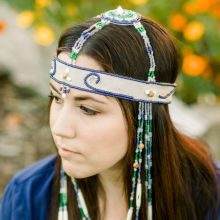Dr. Merculief is a postdoctoral fellow with Stanford University's Equity in Early Education (E3) postdoctoral fellowship program, funded by the Institute of Education Sciences (IES). She received her Ph.D. in Human Development and Family Studies from Oregon State University in 2023. Prior to her doctoral training, she received a B.A. in psychology from Seattle Pacific University and an M.S. in Human Development from Oregon State University. Alexis is an Aleut tribal member and previously worked to promote education, health, and cultural connection in American Indian/Alaska Native children through youth program development at an AI/AN health organization in the Northwest.
How did you choose developmental science as a career?
I began my academic journey by studying psychology as an undergraduate, where I joined a research lab studying young children’s executive function skills. After graduating, I spent several years working as an education advocate and social service provider for urban American Indian/Alaska Native children. In this role, I witnessed the ways in which the metrics for success embedded within grants and resources available to community organizations serving our children do not align with our community values. I went back to graduate school with the intent of doing research to demonstrate how our community values and cultural practices contribute to health and thriving for our children, specifically how these relate to children’s emerging executive function skills. The faculty I encountered within the field of developmental science better matched my theoretical orientation and shared many similar research interests. I have truly enjoyed working in developmental science and it’s been a great fit.
Is there a mentor or mentors who have been instrumental to your career path so far, and, if so, who and how?
There have been many mentors who have encouraged, guided, and supported me on my academic journey. My undergraduate mentor Dr. Bev Wilson taught me about research and gave me the confidence to pursue graduate school. As a social worker and education advocate with urban AI/AN children, my supervisor Marc Taylor came alongside me and was patient with me as I learned how to support our communities while doing very emotionally heavy work. Dr. Monica Tsethlikai was the only Indigenous mentor on my dissertation committee. She has provided me with so much support, steadiness, and grounding throughout graduate school and beyond. I also benefited greatly from my peers and mentors in the Native Children’s Research Exchange Scholars program, like Drs. Michelle Sarche and Nancy Whitesell, who put so much effort into maintaining this amazing program to support emerging Indigenous researchers. They have built a network of peers I can lean on for support and collaboration. Last, during graduate school, I received a great deal of support from Dr. John Geldhof, who showed me that there are true allies in this field and demonstrated that allyship in tangible ways during my graduate studies.
What advice would you give to a prospective graduate student thinking about beginning their Ph.D. studies in the developmental science field?
First, I would say welcome! I would encourage new students by saying that your contribution is welcome and you belong in our field. The ways in which you think and your ideas will always bring a unique and fresh perspective, since no one has had the life experiences you have. There is room for everyone to make a difference in the lives of children. I would also say: you have what it takes. Imposter syndrome is a heavy burden and still impacts me, I’m not sure it will ever truly go away. But you can do it, and you belong. If you are a new Indigenous Ph.D. student, I would encourage you to find a Native mentor or Indigenous academic community group if you do not already have access to one, it will be the lifeline that helps you navigate academia.
What is your best SRCD memory?
My best memories at SRCD are all centered on relationships. I love that most of my colleagues from all stops on my academic journey generally go to SRCD, and it’s a wonderful time to connect with colleagues I haven’t seen in a while. I enjoy that the conference is large enough to cover new and exciting research topics, while still being small enough to navigate well and network with new and old colleagues. Some of my first experiences presenting my work were at SRCD and it’s been my research home for over a decade.
Why did you join the Indigenous Caucus, and how does it facilitate connection among members all year long?
I was ecstatic to learn that the Indigenous Caucus was launching a couple of years ago. I am so happy we have a formal and visible space at SRCD. I was grateful the launch of this caucus aligned with the start of my postdoc, which has afforded me a lot of time to contribute to this caucus, and it’s exciting to know the caucus is starting as I am an early career scholar so I can continue to contribute throughout my academic career. The caucus is very new, so most of the connection facilitated throughout the year has been in the planning and organization phase. I look forward to seeing how this caucus develops more opportunities for connection as it becomes more established in the future.
